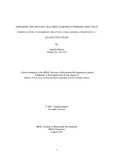| dc.contributor.advisor | Mas-Ud, Abdullah Al | |
| dc.contributor.author | Hannan, Sanjida | |
| dc.date.accessioned | 2022-06-01T09:58:14Z | |
| dc.date.available | 2022-06-01T09:58:14Z | |
| dc.date.copyright | 2021 | |
| dc.date.issued | 2021 | |
| dc.identifier.other | ID 19357031 | |
| dc.identifier.uri | http://hdl.handle.net/10361/16825 | |
| dc.description | This thesis is submitted in partial fulfilment of the requirements for the degree of Masters of Science in Early Child Development, 2021. | en_US |
| dc.description | Cataloged from PDF version of thesis. | |
| dc.description | Includes bibliographical references (pages 40-43). | |
| dc.description.abstract | Distance education is a frequently used term nowadays around the world. Covid-19 pandemic has changed the traditional way of teaching-learning. Instead of traditional classroom teaching, almost all countries have adopted the distance learning approach to block coronavirus spread. Like other countries, Bangladesh adopted the distance learning approach last year as due to the pandemic, all the educational institutions were closed for a long time. Though distance education is present in some forms, it is very narrow and unable to reach all the population around the country, specially in primary education. Exploring the current practice and challenges of distance education at the application level is essential to overcome this barrier. Therefore, this study aims to explore the practice and challenges of distance learning in the primary sector from the perspective of teachers, students, and parents. I chose the qualitative research method with thematic sampling for this study. I collected data from 4 teachers, 2 students, and 2 parents of 6 different schools, both government primary schools and private schools in Panchlaish education thana at Chattogram city, through individual phone and virtual interviews and class observation. The data showed that the participants agree on the necessity of continuing distance education, its practices are still narrow. The challenges they mentioned are lack of devices, internet availability, lack of technological knowledge, financial crisis, and lack of training. Thus, the study proposes more research and making infrastructural development along with knowledge and skill upgradation so that every student can avail proper distance education in a time of any emergency crisis. | en_US |
| dc.description.statementofresponsibility | Sanjida Hannan | |
| dc.format.extent | 48 pages | |
| dc.language.iso | en | en_US |
| dc.publisher | Brac University | en_US |
| dc.rights | BRAC University thesis reports are protected by copyright. They may be viewed from this source for any purpose, but reproduction or distribution in any format is prohibited without written permission. | |
| dc.subject | Online education | en_US |
| dc.subject | Distance learning | en_US |
| dc.subject | Virtual teaching | en_US |
| dc.subject | Education at school | en_US |
| dc.subject | Covid-19 | en_US |
| dc.subject | Pandemic | en_US |
| dc.subject.lcsh | Internet in education | |
| dc.subject.lcsh | Education, Elementary | |
| dc.subject.lcsh | Teaching -- Computer network resources. | |
| dc.title | Exploring the distance teaching-learning in primary education during covid-19 pandemic: practice, challenges and beyond: a qualitative study | en_US |
| dc.type | Thesis | en_US |
| dc.contributor.department | Institute of Education Development, BRAC University | |
| dc.description.degree | M. Early Child Development | |

